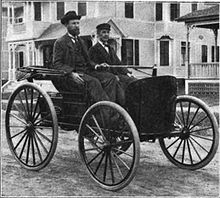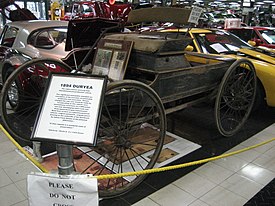Charles Edgar Duryea (December 15, 1861 – September 28, 1938) was an American engineer. He was the engineer of the first working American gasoline-powered car and co-founder of Duryea Motor Wagon Company.[1] He was born near Canton, Illinois, a son of George Washington Duryea and Louisa Melvina Turner, and died in Philadelphia, Pennsylvania, but spent most of his life working in Springfield, Massachusetts. It was in Springfield that Charles and his brother, Frank, produced and road-tested America’s first gasoline-powered car.[2][page needed]
Charles Duryea | |
|---|---|
 Charles Duryea (left) with J. Frank Duryea | |
| Born | December 15, 1861 Canton, Illinois, U.S. |
| Died | September 28, 1938 (aged 76) |
| Resting place | Ivy Hill Cemetery, Philadelphia, Pennsylvania, U.S. |
| Occupation | Engineer |

Biography
editCharles Duryea was born on December 15, 1861, near Canton, Illinois, to George Washington Duryea and Louisa Melvina Turner.[3]
Duryea and his brother Frank (1869–1967) were initially bicycle makers in Washington, D.C., but later became world-renowned as the first American gasoline-powered car manufacturers, headquartered in Springfield, Massachusetts. Their design was inspired by a Benz gasoline-powered car that Charles saw at a fair in Ohio.[4] Generally speaking, Charles engineered the automobiles, while Frank built, tested and raced them.[5]
Tests of the first American gasoline-powered automobile
editOn September 21, 1893, the Duryea brothers road-tested the first-ever, working American gasoline-powered automobile on the Howard Bemis farm in Chicopee, Massachusetts.[6] The Duryea's "motor wagon" was a used horse drawn buggy that the brothers had purchased for $70 and into which they had installed a 4 HP, single cylinder gasoline engine. The car (buggy) had a friction transmission, spray carburetor and low tension ignition.[7] Frank Duryea test drove it again on November 10[7] — this time in a prominent location: past their garage at 47 Taylor Street in Springfield. The next day it was reported[7] by The Republican newspaper with great fanfare.[5]
This particular car was put into storage in 1894 and stayed there until 1920, when it was rescued by a former Duryea engineer Inglis M. Uppercu[8] and presented to the United States National Museum.[7]
The Duryea Motor Wagon Company
editOn November 28, 1895, in Chicago, their vehicle, driven by brother Frank, had won America's first car race. It ran to Evanston, Illinois and back. The only other finisher was one of three Benz cars mostly made in Germany. After Frank won, demand grew for the Duryea Motor Wagon. In 1896, the Duryea Brothers produced 13 cars by hand – in their garage at 47 Taylor Street – and thus Duryea became the first-ever commercially produced vehicle, and also the largest automobile factory in the United States.[10] For the history of the company and its cars, see Duryea Motor Wagon Company.[11]
Duryea sought out investors and buyers while his brother, Frank Duryea, primarily handled the mechanical side of the business.[12]
A Duryea car was involved in America's first known auto accident.[13] New York City motorist Henry Wells hit a bicyclist with his new Duryea. The rider suffered a broken leg, Wells spent a night in jail and the nation's first traffic accident was recorded in March 1896.[13] In 1913, George Vanderbilt purchased and drove a Stevens-Duryea, but was one of few people in the United States who could afford one. His 1913 Duryea is Vanderbilt's only original car kept at his Biltmore Estate.[14]
Duryea ceased manufacturing in 1917.[11]
Duryea died of a heart attack[15] in Philadelphia on September 28, 1938, and was buried in Ivy Hill Cemetery, West Oak Lane.[16][1][3]
Legacy
editDuryea was inducted into the Automotive Hall of Fame in 1973.[17][18]
The annual Duryea Hillclimb is named in his honor.[19]
The Charles Duryea Residence (located in Peoria's historic West Bluff district) was named a City of Peoria Historical Landmark in July 2015; automobiles were manufactured in a barn on the property, which is no longer standing.[20][21] An automobile built in Duryea's barn in 1898 is on permanent display at the Peoria Riverfront Museum.[22][23]
See also
edit- Elwood Haynes, previously credited with the first American gasoline automobile by the Smithsonian Institution
References
edit- ^ a b "Charles E. Duryea, Auto Pioneer, Dies. Credited With Building First 'Gasoline Buggy'. Tested in 1892 in Springfield. Car Now in Smithsonian. Won First Race for Horseless Carriages. Inventor of Many Improvements. Tablet Honors Achievement. Won First Automobile Race. Invented Bicycle Improvements". The New York Times. September 29, 1938. Retrieved September 11, 2012.
Charles E. Duryea, sometimes called the "father of the automobile," died in his home here at 9 A. M. today after an illness of about a year and a half. He was in his seventy-fifth [sic] year.
- ^ May, George W. (January 1, 1996) [1973]. Charles E. Duryea, Automaker. Zero-g Press. ISBN 978-1889849027.
- ^ a b Pennsylvania Historic and Museum Commission; Harrisburg, Pa; Pennsylvania (State). Death Certificates, 1906-1968; Certificate Number Range: 085001-088000
- ^ "Exhibits | Collections - PERMANENT COLLECTION - Duryea Motor Trap - Peoria Riverfront Museum". www.peoriariverfrontmuseum.org. Retrieved October 6, 2023.
- ^ a b "Duryea Bros. Build 1st US Motorcar, Despite Themselves". January 12, 2014.
- ^ Strohl, Daniel (April 19, 2012). "Duryea's debut: 120 years of the American automobile, maybe". Hemmings.
- ^ a b c d Ehtesham (March 6, 2009). "Cars: Duryea's First Car 1893 CE". Bestsellingcars.blogspot.com. Retrieved March 9, 2012.
- ^ "Aeromarine". Retrieved January 12, 2012.
- ^ "New England in Motor History; 1890 to 1916". The Automobile Journal. 41: 9. February 25, 1916.
- ^ "Frank Duryea wins first U.S. horseless-carriage race – History.com This Day in History – 11/28/1895". History.com. Archived from the original on February 8, 2011. Retrieved March 9, 2012.
- ^ a b Berkbile, Don. The 1893 Duryea Automobile, (1964).
- ^ "Duryeas First but It Didn't Last", Automotive News. News Pg. February 3, 26, 1996
- ^ a b "The Duryea Brothers – Automobile History". Inventors.about.com. September 16, 2010. Archived from the original on July 10, 2012. Retrieved March 9, 2012.
- ^ "Our Story – Preservation – Vintage Car". Biltmore.com. Archived from the original on January 26, 2013. Retrieved March 9, 2012.
- ^ "Charles Duryea, auto's inventor, taken by death". Ellensburg Daily Record. September 28, 1938. p. 3. Retrieved January 3, 2017.
- ^ "Auto Inventor Dies. Charles Duryea Credited With First Gasoline Buggy". Associated Press. September 29, 1938. Retrieved September 11, 2012.
- ^ "Duryea Brothers". theinventors.org. Retrieved March 8, 2016.
- ^ "Charles E. Duryea". Hall of Fame Inductees. Automotive Hall of Fame. 1973. Archived from the original on March 9, 2016. Retrieved March 6, 2016.
- ^ "Duryea / Pagoda". Pennsylvania Hillclimb Association. 2017. Retrieved November 10, 2017.
Named for the obscure automobile maker and following the same route that Charles Duryea used to test his cars.
- ^ "Local Landmarks - Historic Residences | Peoria, IL". www.peoriagov.org. Retrieved October 6, 2023.
- ^ Vlahos, Nick (June 24, 2015). "West Bluff house once owned by Charles Duryea motors toward historic designation". Peoria Journal Star. Retrieved October 6, 2023.
- ^ Hilyard, Scott (September 11, 2012). "Duryea automobile travels to new home at museum". Peoria Journal Star. Retrieved October 6, 2023.
- ^ "Exhibits | Collections - PERMANENT COLLECTION - Duryea Motor Trap - Peoria Riverfront Museum". www.peoriariverfrontmuseum.org. Retrieved October 6, 2023.
Further reading
editDuryea, Charles; Homans, James E. (1916) The Automobile Book Sturgis & Walton, New York; at Open Library. The first chapter briefly surveys the early evolution of automobiles, with mention of his own involvement from 1891 and the famous victory of the Duryea Motor Wagon in the first London-to Brighton race (1996).